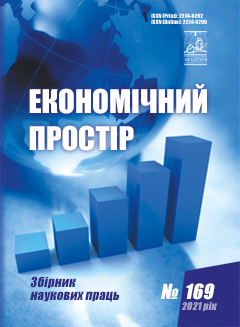INFORMATIZATION AS A CATALYST FOR TRANSITION TO THE KNOWLEDGE SOCIETY
Abstract
The article considers that informatization is a cumulative process, since it is informatization that enhances the quality of interaction between engineering and technology, socio-economic relations and forms, building up the basis for macro generations in socio-economic systems and transforming social production at each stage of development. These dependencies are reflected in the authors’ method of analyzing the current information cycle. The proposed methodology has become one of the blocks building up the authors’ general algorithm for the analysis and management of the current information cycle, involving a comprehensive analysis and development of areas and methods for managing interphase and inter-stage transitions within the current transition period to the knowledge society.
References
Towards knowledge societies: UNESCO world report 2005. Available at: https://unesdoc.unesco.org/ark:/48223/pf0000141843
Kraus, N. M. (2015). Сategorical difference of notions “novation”, “novelty” and “innovation” as tools ofinnovative economy: institutional context. Institutional framework for the functioning of the economy in the context of transformation: Collection of scientific articles. Montreal : Publishing house “BREEZE” , 53–58.
Dovgal, O., Dovgal, G. (2015). Innovative economy. Kharkiv, V.N. Karazin Kharkiv National University.
Demsetz, H. (1969). Information and efficiency: Another viewpoint, Journal of Law and Economics, 16 (1), 1–10.
Crawford, S. (1983). The origin and Development of a Concept: the Information Society. Available at: http://www.ncbi.nlm.nih.gov/pmc/articles/PMC227258/pdf/mlab00068-0030.pdf
Delaunay, J. C., Gadrey, J. (1992), Service Society Versus Neo-Industrialism. In: Services in Economic Thought. International Studies in the Service Economy, Vol 3. Springer, Dordrecht. https://doi.org/10.1007/978-94-011-2960-2_6
Paulman, V. F., (2011). Virtual economy. Available at: http://lit.lib.ru/p/paulxman_w_f/text_0230.shtml.
Lemeshchenko, P. S. (2001), Neoeconomics: subject certainty and theoretical contours. Available at: https://www.bsu.by/Cache/pdf/351783.pdf
Colin, N., Landier, A., Mohnen, P. & Perrot, A. (2015). The Digital Economy. Notes du conseil d’analyse économique, 7(7), 1–12. Available at: https://doi.org/10.3917/ncae.026.0001
Hirschhorn, L., (1988). The Post-Industrial Economy: Labour, Skills and the New Mode of Production, The Service Industries Journal, 8:1, 19–38, DOI: https://doi.org/10.1080/02642068800000003
Courvisanos, J. (2006). Galbraith and the political economy of technological innovation: Critical perspectives and a heterodox synthesis, in B. Laperche, J. Galbraith and D. Uzunidis (eds), Innovation, Evolution and Economic Change: New Ideas in the Tradition of Galbraith, Cheltenham UK and Northampton, MA, Edward Elgar, 205–228.
Courvisanos, J. (2012). Cycles, Crises and Innovation: Path to Sustainable Development – A Kaleckian-Schumpeterian Synthesis, Cheltenham UK Northampton, USA, Edward Elgar.
Towards knowledge societies: UNESCO world report 2005. URL: https://unesdoc.unesco.org/ark:/48223/pf0000141843
Kraus N. M. Сategorical difference of notions “novation”, “novelty” and “innovation” as tools ofinnovative economy: institutional context // Institutional framework for the functioning of the economy in the context of transformation: Collection of scientific articles. Montreal : Publishing house “BREEZE”, 2015. P. 53–58.
Довгаль О. А., Довгаль Г. В. Інноваційна економіка. Харків : ХНУ імені В. Н. Каразіна, 2015. 148 с.
Demsetz H. Information and efficiency: Another viewpoint, Journal of Law and Economics, 1969, 16 (1), 1-10.
Crawford S. The origin and Development of a Concept: the Information Society. 1983. URL: http://www.ncbi.nlm.nih.gov/pmc/articles/PMC227258/pdf/mlab00068-0030.pdf
Delaunay J. C., Gadrey J. Service Society Versus Neo-Industrialism. In: Services in Economic Thought. International Studies in the Service Economy, Vol 3. Springer, 1992, Dordrecht. URL: https://doi.org/10.1007/978-94-011-2960-2_6
Паульман В. Ф. Виртуальная экономика. 2011. URL: http://lit.lib.ru/p/paulxman_w_f/text_0230.shtml.
Лемещенко П. С. Неоэкономика: предметная определённость и теоретические контуры. 2001. URL: https://www.bsu.by/Cache/pdf/351783.pdf.
Colin N., Landier A., Mohnen P. & Perrot A. The Digital Economy. Notes du conseil d’analyse économique, 2015, 7(7), 1–12. URL: https://doi.org/10.3917/ncae.026.0001
Hirschhorn L. The Post-Industrial Economy: Labour, Skills and the New Mode of Production, The Service Industries Journal, 1988, 8:1, 19–38. DOI: https://doi.org/10.1080/02642068800000003
Courvisanos J. Galbraith and the political economy of technological innovation: Critical perspectives and a heterodox synthesis, in B. Laperche, J. Galbraith and D. Uzunidis (eds), Innovation, Evolution and Economic Change: New Ideas in the Tradition of Galbraith, Cheltenham UK and Northampton, MA, Edward Elgar, 2006. P. 205–228.
Courvisanos J. Cycles, Crises and Innovation: Path to Sustainable Development – A Kaleckian-Schumpeterian Synthesis, Cheltenham UK Northampton, USA, Edward Elgar, 2012.



